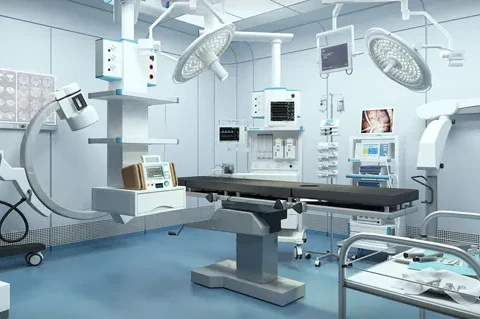By Abiemwense Moru
An Analysis by Abiemwense Moru
Nigeria is standing at a transformational crossroads in its healthcare journey.
While challenges exist, so do opportunities, big, bold opportunities to reimagine the nation’s hospitals, elevate medical services and ensure that quality healthcare is not only accessible at home but also trusted and globally respected.
What once felt like an impossible dream, ending medical tourism, is now a national conversation backed by reforms, innovation and dedicated professionals determined to turn things around.
With collaborative action and strategic investment, Nigeria is poised to fix its hospitals and emerge as a medical powerhouse in Africa.
In recent years, government health budgets have expanded, setting the foundation for progress.
Experts are now aligning around how to make those budgets impactful and visible in hospitals and clinics nationwide.
At the 2025 Nigeria Surgical Congress held in Lagos, Prof. Bala Shehu, the Vice-Chancellor of Federal University of Medical and Health Sciences, Funtua, delivered a visionary keynote address.
He underscored the need to channel resources into modernising teaching hospitals, equipping them with up-to-date tools, improving infrastructure and creating work environments that retain the country’s brightest medical minds.
He said “healthcare financing is improving and we’re in a strong position to ensure every Nigerian can access high-quality treatment without financial hardship.”
His message was clear when he said “with the right priorities, the system can evolve into a beacon of excellence.
“Nigeria’s medical workforce remains one of its greatest strengths. However, retaining these professionals is key.
“Many young doctors have sought opportunities abroad due to limited tools and difficult working conditions.”
Recognising this, national discussions now emphasise better pay, career development and safer, well-equipped hospitals.
As Shehu aptly put it, “to keep our best brains, we must treat them like they matter.”
Encouragingly, both federal and state institutions are now proposing structured retention policies, improved compensation and expanded training programmes, essential steps to keeping Nigerian talent in Nigeria.
Some public hospitals are already demonstrating what’s possible with targeted investment.
The University of Abuja Teaching Hospital (UATH) recently expanded its bed space from 350 to more than 500, a major milestone in improving patient care.
According to Prof. Bissala Ekele, the UATH Chief Medical Director, the expansion highlights the hospital’s ambition to meet rising demand and deliver better outcomes.
UATH’s next steps, he added, include acquiring advanced diagnostic tools like MRI machines and strengthening electricity supply, investments that are already in motion, thanks to increased attention from lawmakers and healthcare committees.
Nigeria’s lawmakers are taking more active roles in healthcare oversight.
The House of Representatives Committee on Health Institutions, chaired by Rep. Amos Magaji, pledged stronger action to reduce outbound medical travel.
Many of their recent motions aim to improve access to specialist services in underserved regions, upgrade existing facilities and increase transparency in healthcare funding.
Rep. Nnamdi Ezechi, for instance, urged the Federal Government to strengthen healthcare services in the Federal Capital Territory (FCT), highlighting the need to modernise facilities to match growing population demands.
This kind of legislative focus is crucial to achieving sustained improvements across the board.
The private healthcare sector is also playing a crucial role in bridging gaps, currently attending to an estimated 70–80 per cent of Nigeria’s patient population.
According to Dr Kay Adesola, the President of the Association of Nigeria Private Medical Practitioners (ANPMP), private hospitals have become frontline responders for emergency cases, childbirth complications and chronic disease care.
To strengthen this role, Adesola called for supportive government policies, tax relief on medical equipment and better integration of the National Health Insurance Authority (NHIA) into private practice.
He said the moves would allow more Nigerians to access quality care without facing financial hardship, while supporting long-term sustainability of private clinics.
Consequently, there is growing consensus that with the right policy framework, the private sector can lead Nigeria’s healthcare renaissance.
Exciting medical innovations are already taking shape within Nigeria. The Loveworld Medical Centre (LMC) in Lagos has introduced nuclear medicine technology, including the Gamma Camera for early detection and treatment of cancers.
This development is reducing the need for patients to travel abroad for specialised care.
Dr Anthony Oseghale, LMC’s Chief Operating Officer, said “our treatments are often more affordable than a flight ticket.
The hospital’s approach combines high-tech care with personalised, minimally invasive treatment, significantly improving patient outcomes with fewer side effects and shorter recovery times.
This kind of forward-thinking model is showing Nigerians that world-class care can be found right at home.
The most recent one is the African Medical Centre of Excellence (AMCE), a private hospital in Abuja which started operations on June 5, 2025 as a specialist hospital for non-communicable diseases such as cancer, cardiovascular diseases and blood disorders – including sickle cell anaemia, most common in African populations – and other conditions.
Developed by Afreximbank in partnership with King’s College Hospital, London, AMCE is designed to provide top-notch medical services locally available.
Brian Beaver, the Chief Executive Officer (CEO) of AMCE, said “we’ve recruited from all over the world the very best we can find.
“And as it turns out, the very best frequently were Nigerian doctors and nurses. No matter where we go, the best health institutions in the world, the top echelons are filled with Nigerian doctors and nurses.
Another encouraging trend is the integration of digital technology into healthcare delivery.
The Nigerian Communications Commission (NCC) recently supported the establishment of an e-health facility in Akure, providing digital tools for efficient record-keeping, real-time diagnosis and coordinated care.
According to Dr Aminu Maida, the Vice Chairman of the NCC, the digital upgrade represents the future of healthcare in Nigeria.
He said it is a replicable model that could transform rural and urban hospitals alike, making healthcare accessible, efficient and data-driven.
Meanwhile, improving healthcare access in northern part of the country remains a national priority, as Nigerian Red Cross Society (NRCS) highlights the urgent need to support children and families affected by malnutrition, particularly in Katsina, Niger, Sokoto, Yobe and Zamfara.
Encouragingly, community-led initiatives, government food programmes and mobile health outreach are helping to combat preventable diseases tied to poor nutrition.
Programmes targeting malaria, cholera and diarrhea are expanding, supported by local volunteers, NGOs and international partners.
With sustained investment and coordination, health outcomes in rural and vulnerable areas are steadily improving.
While building new hospitals is important, sustainability is essential. The goal is to ensure that facilities operate 24/7 with reliable power, clean water, stocked pharmacies and skilled personnel.
To this end, several states are now exploring solar energy solutions for hospitals, investing in power backups and streamlining supply chains for medical consumables.
These actions will not only keep hospitals running smoothly but will also improve patient trust and safety.
Moreover, discussions are ongoing about requiring elected officials to use public health facilities, a move that would increase accountability and ensure the health system receives the attention and respect it deserves.
Nigeria currently spends more than 2 billion dollars annually on medical tourism, a figure that is now driving reform.
Government and private institutions are increasingly investing in diagnostic and surgical capabilities to match global standards.
From advanced cancer treatment at LMC to world-class cardiac care at Reddington Hospital and Eko Hospital in Lagos, Nigerians now have access to services that once required travel abroad.
However, the vision is bigger than just stopping outbound travel. With the right strategy, Nigeria can become a destination for medical tourism in Africa, attracting patients from neighbouring countries seeking affordable and quality care.
Fixing Nigerian hospitals and ending medical tourism is, therefore, more than a policy goal; it’s a national movement gaining momentum.
It calls for continued leadership, accountability and public-private synergy.
Citizens, professionals, lawmakers and civil society organisations must work together to deliver a healthcare system that reflects Nigeria’s potential.
The foundations are being laid. Hospitals are expanding. Technology is being embraced. Medical minds are returning, and confidence is being rebuilt.
Nigeria is more than capable of transforming its health sector into one that saves lives, retains talent and instills pride.
The journey is underway and with commitment, compassion and courage, a healthier future is not just possible, but inevitable.
Follow us on all social media platforms @dailyquery for news and analyses around the globe.



























